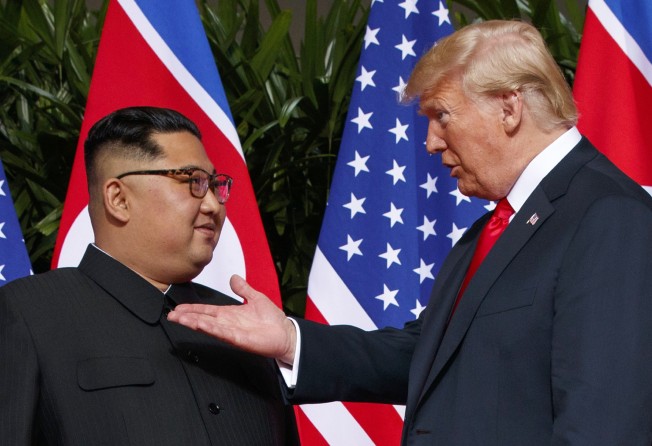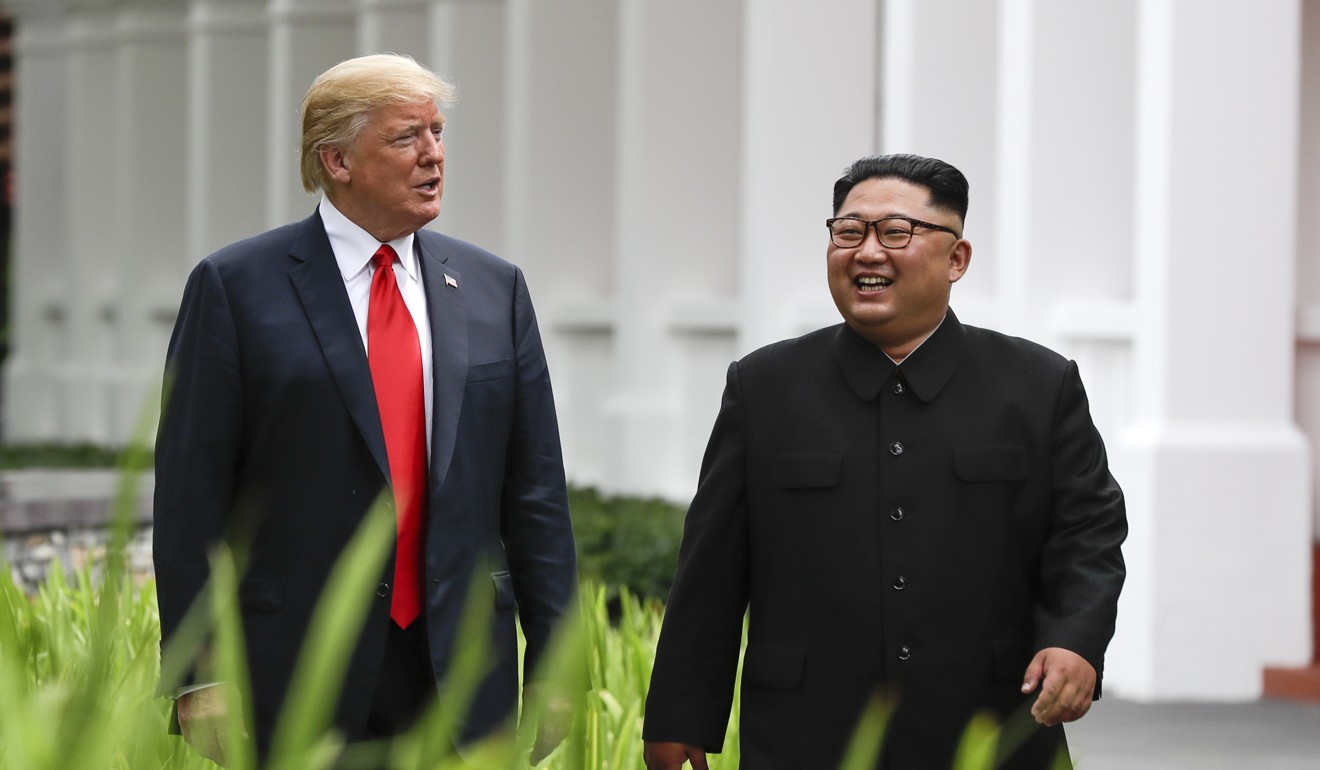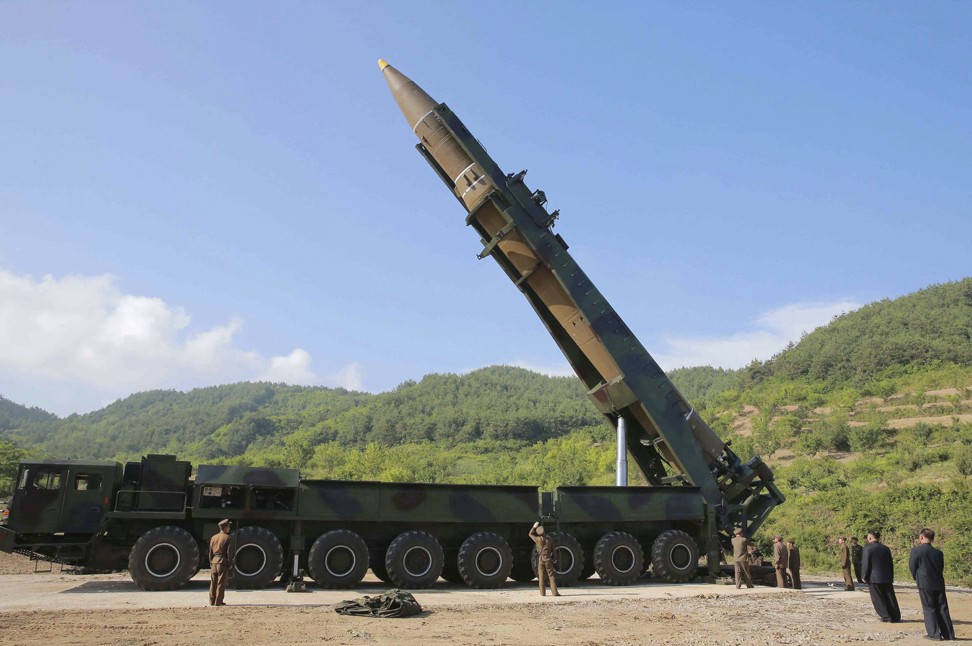Meeting for breakfast with our Nation’s Governors - then off to Vietnam for a very important Summit with Kim Jong Un. With complete Denuclearization, North Korea will rapidly become an Economic Powerhouse. Without it, just more of the same. Chairman Kim will make a wise decision!
— Donald J. Trump (@realDonaldTrump) February 25, 2019
Trump-Kim summit 2019: will a softer approach get a firm result on Pyongyang’s denuclearisation?
- The US president has struck a less confrontational note ahead of the Hanoi summit, but sceptics say he is maintaining the ‘fiction of disarmament’
- China and South Korea are hoping for peace on the peninsula, with the latter holding out for a declaration that would finally end the Korean war

United States President Donald Trump’s tweetstorm hours before he departed for Hanoi has offered the clearest picture yet of the tack he will take with North Korean leader Kim Jong-un during the two-day nuclear talks that begin in the Vietnamese capital on Wednesday.
Long gone were the “Little Rocket Man” diatribes of 2017, when Trump first started taking aim at Pyongyang’s nuclear programme.
In their place was an approach that offered far more carrots than sticks in persuading the young North Korean leader to dismantle his nuclear arsenal.
“With complete denuclearisation, North Korea will rapidly become an economic powerhouse,” wrote Trump. “Without it, just more of the same. Chairman Kim will make a wise decision!”
That softly-softly approach will be tightly scrutinised during the talks, albeit in varying degrees by different actors, with the likes of China, South Korea, Trump’s domestic opponents and even hosts Vietnam all having distinct opinions on the way forward for the denuclearisation process.
Trump’s most strident critics say he is guilty of grandstanding and is using the Hanoi summit to distract the public from his domestic political woes – just as he did with his historic meeting with Kim last June in Singapore.
This week’s summit coincides with a public testimony before Congress by Trump’s disgraced former personal lawyer Michael Cohen over investigations into Russian interference in the 2016 US election.
Nuclear non-proliferation analysts meanwhile say they are alarmed by signals the meeting could see the Trump administration offer Pyongyang sanctions relief even if Kim does not commit to long-standing international demands for “complete, verifiable and irreversible denuclearisation”.
So funny to watch people who have failed for years, they got NOTHING, telling me how to negotiate with North Korea. But thanks anyway!
— Donald J. Trump (@realDonaldTrump) February 24, 2019
Trump’s pre-summit tweets acknowledged the criticism.
The president wrote: “So funny to watch people who have failed for years, they got nothing, telling me how to negotiate with North Korea. Thanks anyway!”
Daniel Russel, a top Obama-era Asia policy official, said while “we can hope for the best” that Trump’s strategy would work, “hope is not a strategy”.
“If Ronald Reagan had professed his ‘love’ for Mikhail Gorbachev, relaxed pressure on the Soviet Union, alienated America’s allies, and allowed the Soviet economy to improve, the Berlin Wall would still be standing,” said Russel, vice-president of the Asia Society think tank.
That sentiment does not appear to be isolated.
Srinivasan Sitaraman, a respected North Korea analyst at Clark University in Massachusetts, said the “real fear among the nuclear non-proliferation community is that Trump will settle for something way below the denuclearisation threshold and remove sanctions in return”.
Vipin Narang, from the Massachusetts Institute of Technology, said he believed “Trump doesn’t care if Kim doesn’t disarm, so long as Kim doesn’t embarrass him with nuclear or ballistic missile tests”.
“Trump’s interest is to sustain the fiction of disarmament for as long as possible to continue claiming a win on foreign policy toward North Korea, and that he averted a war.”
KIM’S LIP SERVICE
Open-source analysis of Pyongyang’s atomic research suggests Kim was only offering lip service when he agreed to sign up to a vague declaration on denuclearisation during the Singapore summit.
Steps taken by Pyongyang since then – destroying tunnels at a nuclear test site and dismantling a missile site – have been cast by non-proliferation experts as symbolic or reversible.
Earlier this month, researchers at Stanford University concluded that Pyongyang had continued to produce nuclear material since the Singapore summit, potentially generating enough fuel for as many as seven additional nuclear weapons.
Some analysts say Trump’s approach takes into account Pyongyang’s deception. Rather than discard the limited progress made – North Korea has not conducted nuclear tests since September 2017 – these observers say the White House’s strategy may be to contain the risk posed by Kim’s regime.
“Pursuing more limited goals in the short term, such as preventing the further growth of North Korea’s nuclear arsenal, builds toward denuclearisation and raises confidence in the negotiating process,” said Kelsey Davenport, director for non-proliferation policy at the Arms Control Association in Washington.
With Kim’s reference to his country’s nuclear arsenal as a “treasured sword that guarantees peace”, there is “no particular reason to think he plans to disarm in the foreseeable future”, according to Joshua H. Pollack, editor of the Nonproliferation Review journal.
Ideally, non-proliferation experts say they would like this week’s talks to tie Pyongyang down on several pledges.
Among them are the provision of an inventory of weapons and nuclear sites and the admission of international inspectors into North Korea to verify the destruction of nuclear facilities.
On top of the wish list is the closure of the Yongbyon nuclear facility, the country’s only known source of nuclear material. Under the leadership of Kim’s late father Kim Jong-il, a cooling tower at the facility was demolished in 2008. However, the facility – located about 100km north of Pyongyang – was reactivated the following year.
“Shutting down Yongbyon’s 5-megawatt reactor isn’t the end of North Korean fissile material production, but it would certainly constrain its future force posture by shunting off the only known source of plutonium, and perhaps tritium too, for H-bombs,” Narang said. “[The facility] may be nearing end of life so Kim may be willing to give it up as a ‘concession’ anyway.”
The analysts say Kim himself is likely to have a wish list distinct from these demands. In the immediate term, one demand could be for critical sanctions relief to come before full denuclearisation.
While Pyongyang does not publish gross domestic product (GDP) data, South Korea last year said its northern neighbour’s economy contracted at its sharpest rate in two decades in 2017. North Korea’s GDP is believed to be more than 40 times smaller than South Korea’s output.
Kim Jong-ha, a security expert at Hannam University in South Korea, said Kim might also ask for the reopening of the Kaesong industrial complex – an inter-Korean endeavour that was a significant cash cow for Pyongyang before it was closed in 2016 amid a fresh bout of nuclear tests.
The North Korean leader might also ask for the opening of a “US liaison office” in Pyongyang, the security analyst said.
NOT JUST A KIM AND TRUMP SHOW
China will be among the international players keeping an eye on developments in Hanoi.
Lu Kang, China’s foreign ministry spokesman, on Tuesday said Beijing hoped the summit would help propel the US and North Korea “substantial steps forward in terms of realising denuclearisation and peace and stability on the peninsula”.
South Korea has also expressed hopes for substantive progress in the talks. One outcome Seoul would welcome is a declaration that would formally end the war between the two Koreas.
The 1950-1953 conflict ended with an armistice, not a formal peace agreement, meaning the two sides are technically still at war.

Kim Eui-kyeom, spokesman for South Korean President Moon Jae-in, on Monday said he believed the US and North Korea might reach such an agreement. “There can be many ways (to declare the war’s end) and our government welcomes any form of declaration … A declaration by the North and the US should be enough if it comes to that.”
Vietnam, which has drawn plaudits for its rapid organisation of the summit, may also be hoping for a few dividends arising out of the talks in its capital.
Observers say hosting the summit could consolidate Hanoi’s efforts to align itself with the US as it faces an increasingly assertive China in the disputed South China Sea.
Hanoi has been the holdout among Southeast Asian countries chastising China’s military build-up in the area, with others – dependent on Beijing’s economic largesse – scaling down their rhetoric.
The sceptics say the main outcome they will be watching is whether Trump’s new approach with Kim will bear fruit.
“The greatest fear would be that Trump will impulsively do something that would put the next administration or even his own administration in a bad spot,” Clark University’s Srinivasan said.
And Russel, the Obama-administration official, said it was critical the Hanoi summit yielded “a process that reduces North Korea’s ability to threaten the US and our allies”.
“Given the deep distrust between the DPRK and the US, the DPRK still has a strong incentive to maintain an independent nuclear deterrent capability for the foreseeable future,” said Zhao Tong, a fellow with the Nuclear Policy Programme at the Carnegie-Tsinghua Centre for Global Policy in Beijing, using the official name of the Democratic People’s Republic of Korea.
“[Besides], the international community also does not possess strong enough coercive leverage over the DPRK to force the country into nuclear disarmament. That is a reality we need to face. Consequently, the international community has little choice but to set a realistic goal for diplomatic negotiations with the DPRK.”
